Bootcamp For The Healthcare Team
$59.00$199.00 (-70%)
- Plan to incorporate the newest strategies for successful treatment of Irritable Bowel Syndrome.
Bootcamp For The Healthcare Team
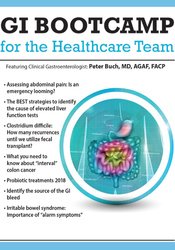
- Assessing abdominal pain: Is an emergency looming?
- The BEST strategies to identify the cause of elevated liver function tests
- Clostridium difficile: How many recurrences until we utilize fecal transplant?
- What you need to know about “interval” colon cancer
- Probiotic treatments 2018
- Identify the source of the GI bleed
- Irritable bowel syndrome: Importance of “alarm symptoms”
Last week, you met Henry, a 67-year-old man who was seen for rectal bleeding and who had an Hgb of 9. He tells you that he had a normal screening colonoscopy just 1 year ago. Now workup reveals a sigmoid cancer. How could this happen? How can we prevent this from occurring in other patients? Let’s learn about “alarm symptoms,” key colon cancer risk factors, “interval cancer,” the latest alternatives to colonoscopy and ways to ensure that our patients stay on their colon cancer screening schedules.
How many times have you been frustrated when you review your patient’s abnormal liver function tests? Is it Hepatitis A, B, C, a medication side effect or Fatty Liver Disease?
Are statins OK in your patient?
How do we choose between ASA and Acetaminophen in chronic liver disease?
Learn from Clinical Gastroenterologist, Peter Buch, MD, AGAF, FACP, and leave this training with the following skills:
- Confidently assess patients presenting with acute and chronic abdominal pain
- Understand the latest treatments for Clostridium Difficile
- The latest techniques to evaluate and treat GI bleeding
- Help differentiate Irritable Bowel Syndrome from other conditions
- Evaluate acute and chronic abdominal pain.
- Choose between commonly-ordered liver function tests for clinical significance.
- Explain what you need to know about Hepatitis C.
- Determine the current best practices in colon cancer prevention.
- Understand which medical conditions respond to probiotics.
- Analyze the best strategies to determine the source of the GI bleed.
- Explore important updates in Clostridium difficile treatment.
- Plan to incorporate the newest strategies for successful treatment of Irritable Bowel Syndrome.
- Assessing Abdominal Pain
- The diagnostic tool chest
- Learn from memorable case studies
- How the PQRST system helps make the diagnosis:
- P: Positional, palliating, provocative factors
- Q: Quality
- R: Region, radiation, referral
- S: Severity
- T: Temporal factors
- Looming emergency or just an ileus?
- Assessing Elevated Liver Function Tests
- Clinical importance of liver function tests
- Non-Alcoholic Fatty Liver Disease: A new epidemic
- Identify at-risk patients and the best treatments available
- Commonly-encountered gallbladder duct dilemmas
- The A, B, Cs of Hepatitis
- Colon Cancer Prevention
- Best practices for colon cancer prevention
- Who needs a colonoscopy?
- Hemoccult, “FIT,” and “Cologuard”
- What you need to know about “interval” cancer
- Young patients with colon cancer
- Clostridium Difficile Challenges
- Understanding the importance of a “carrier state”
- Clostridium difficile prevention
- Antibiotic choices
- How to assess recurrences
- Potential risks of fecal transplants
- How Probiotics may help
- How many recurrences until we utilize fecal transplant?
- Avoiding complications
- Evaluating and Treating GI Bleeding
- Assessing your patient
- Upper, lower or small bowel source
- Advanced techniques to localize the source of bleeding
- Non-surgical treatment of GI bleeding
- Our great challenge: The very elderly population and GI bleeding
- Successful Management of Irritable Bowel Syndrome
- How we make a diagnosis in 2018
- Are we missing another diagnosis?
- Importance of “alarm symptoms”
- Partnering with your patient
- Understanding a FODMAP diet
- OTC medicines that help
- Latest treatments

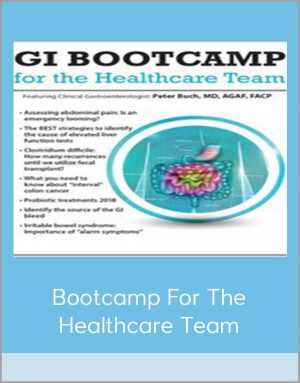
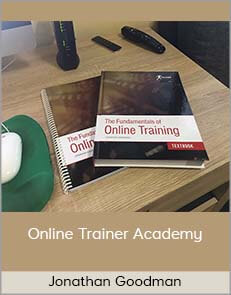
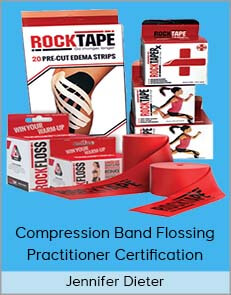








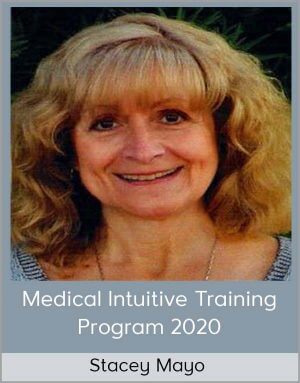


Reviews
There are no reviews yet.